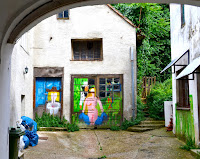A statue of Petrica Kerempuh looks over the Zagreb Market.
He’s the Croatian equivalent of Punch or Till Eulenspiegel, the Joker: a folk
character who makes fun of everyone, reminding us to laugh in the face of
misfortune. So, he’s depicted as a troubadour, singing to a hanged man!
Just off the Market area we came upon a 6-foot tall painted
egg. It sat outside a Croatian Naïve Art store and portrayed the countryside in
summer on one side and winter on the other, as you walked around it; the store
was closed but we liked the style so much we went in search of the Croatian
Museum of Naïve Art to see more examples. Ironically, on the way, I peeped down
an alleyway and spied painted figures on doors.
 So, on our second day we climbed to Gradec, or Gornji Grad,
the second hill in Zagreb old town to seek out the museum. We’d intended to ride
the historic funicular railway, but it was closed for renovation. We’re not
getting any younger and it was a steep climb but we were rewarded by a
delightful piece of graffiti, a crowned cat, painted in the pedestrian tunnel
that runs under the railway.
So, on our second day we climbed to Gradec, or Gornji Grad,
the second hill in Zagreb old town to seek out the museum. We’d intended to ride
the historic funicular railway, but it was closed for renovation. We’re not
getting any younger and it was a steep climb but we were rewarded by a
delightful piece of graffiti, a crowned cat, painted in the pedestrian tunnel
that runs under the railway.
We reached the top and headed for the Church of St Mark.
Famous for its strikingly tiled roof bearing the flags of Croatia and Zagreb,
this building sits in the centre of a square facing the Parliament Buildings. Built
in the 13th Century, only the Gothic entrance with its niches
remains from that time; the tiles were added in 1882. We went inside the church
after being refused entry to Parliament – the guard looked bemused that I’d
asked him…
After relaxing in the sun in a street side café with a coffee, we headed to the Museum of Naïve Art, just as it opened. “You can take as many pictures as you like, but no flash please,” the woman that sold us our tickets said. So, I did. I fell in love with the pictures and have included segments here. Folk art, or naïve art as it’s called here, featuring paintings by largely untrained artists, is an important aspect of Croatian culture. The topics are mostly religious or country life inspired but very powerful and often violent images.
Sitting right across from this museum is another gem – the
Museum of Broken Relationships. This museum has been open for 10 years and features the remnants of failed relationships;
it has proven so successful that it’s been on a world tour and now has a sister
museum in L.A. There are many exhibits including the spiteful Toaster of
Vindication, but the thing that still sticks in my brain is an axe used by a
woman to chop up her ex lover’s furniture.
I finished our visit to this part of town by scaling the
first, and easiest, of many sets of wooden steps I’d climb on our Croatian
journey. These stairs sit in the Tower of Lotrscak and I climbed to the top
where a gallery offers spectacular views over the city. On the way up I noticed
a rope that hung all the way down; a sign was tied to it saying: ‘Do Not Pull
the Bell Rope!’ I was tempted.
 |
| Church of St Mark, Gornji Grad, Zagreb |









